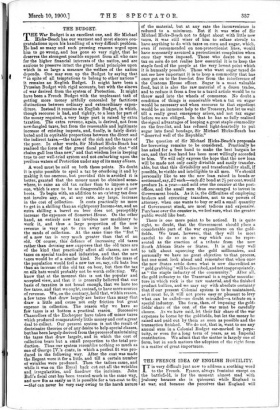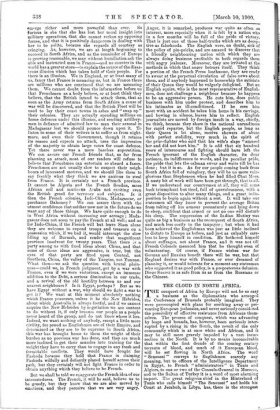THE FRENCH IDEA OF ENGLISH HOSTILITY.
IT is very difficult just now to address a soothing word to the French. France, always feminine except on the battlefield, is for the moment almost mad with jealousy because she is quiescent while England is at war, and because she perceives that England will emerge richer and more powerful than ever. So furious is she that she has lost her usual insight into military operations, that she cannot reckon up opposing forces, and that it is positively dangerous in dealing with her to be polite, because she regards all courtesy as cringing. As, however, we are at length beginning to succeed in South Africa, and as the remainder of Europe is growing reasonable, we may without humiliation ask the able and instructed men in France—and no country in the world has a greater store—to explain the source of the disas- trous illusion which has taken hold of their people. For there is an illusion. We in England, or at least many of us, fancy that France is menacing us, but in France there are millions who are convinced that we are menacing them. We cannot doubt from the information before us that Frenchmen as a body believe, or at least think they believe, that the British intend to attack them, that as soon as the Army returns from South Africa a cause of war will be discovered, and that the British Fleet will be used to lay their coast towns in ashes and "snap up" their colonies. They are actually spending millions on home defences under this illusion, and sending artillery- men in defiance of admitted law to man their arsenal in Madagascar lest we should pounce down upon it. To listen to some of their writers is to suffer as from night- mare, and even their Government, though it retains its reason and expects no attack, uses the impression of the majority to obtain large votes for coast defence. Yet there never was a more baseless superstition. We can assure our French friends that, so far from planning an attack, most of our readers will refuse to believe that Frenchmen can entertain so absurd a fancy. Frenchmen are not usually slow to suspect their neigh- bours of interested motives, and we should like them to say frankly what they think we are anxious to steal from France. It is certainly not a French province. It cannot be Algeria and the French Soudan, more African soil and mutinous Arabs not exciting even the British greed for territory and subjects. Is it then the French colonies, Indo-China, Madagascar, or perchance Dahomey ? We can assure them with the utmost confidence that neither now nor in the future do we want any of those things. We have quite enough to do in West Africa without increasing our acreage ; Mada- gascar does not seem to pay the French at all well; and as for Indo-China, if the French will but leave Siam alone they are welcome to expend troops and treasure on a possession which, if we had it, would interrupt the slow filling up of Burmah, and render that magnificent province insolvent for twenty years. That there :s a party among us with fixed ideas about China, and that some of those ideas are aggressive, is true, but the eyes of that party are fixed upon Central, not Southern, China, the valley of the Yangtse, not Yunnan. What then--we ask the question with brutal plain- ness—could we, in French judgment, get by a war with France, even if we were victorious, except an immense addition to the Debt, a serious diminution in our trade, and a revival of the old hostility between us and our nearest neighbours ? Is it Egypt, perhaps ? But as we have Egypt without a war, why should we fight a war to get it ? We want at this moment absolutely nothing which France possesses, unless it be the New Hebrides, about which Australia is always fretful, and if we cannot acquire the New Hebrides by negotiation we are content to do without it, if only because our people as a people never heard of the group, and do not know where it lies. Indeed, we want nothing of anybody, except a little more civility, for proud as Englishmen are of their Empire, and determined as they are to be supreme in South Africa, this war has brought home to them the weight of their burden as no previous war has done, and they are much more inclined to get their muscles into training for the weight they have to carry than to engage in any fresh and formidable conflicts. They would have fought for Fashoda because they held that France in claiming Fashods, wilfully and defiantly placed herself across their path, but they certainly will not fight France in order to obtain anything which they believe to be French.
But we shall be told we exaggerate the French idea of our interestedness. The French, it will be said, believe us to be greedy, but they know that we are also moved by emotions, and they perceive that we are very angry. Anger, it is remarked, produces war quite as often as interest, more especially when it is felt by a nation who in a few months will be full of the pride of victory. That is just one of those half-truths which are as decep- tive as falsehoods. The English were, no doubt, sick of the policy of pin-pricks, and are amazed to discover that a friendly neighbouring nation with which they are always doing business profitable to both regards them with angry jealousy. Moreover, they are irritated at the methods in which that anger betrays itself. They think a portion of the French Press loathsome, they are ready to swear at the perpetual circulation of false news about them, and if anybody happened to horsewhip the satirists of their Queen they would be vulgarly delighted. But an English squire, who is the most representative of English- men, does not challenge a neighbour because he happens to be an aggressive person. He cuts him, does public business with him under protest, and describes him to his intimates as ill-conditioned. If he sees him meet with an accident he takes him home in his carriage, and bowing in silence, leaves him to reflect. English journalists are moved by foreign insult in a way, chiefly, we think, becaute they share in the national unreadiness for rapid repartee, but the English people, as long as their Queen is let alone, receive showers of abuse with perfect stolidity, very much in the spirit of the prize-fighter who said that his wife's slaps "amused her and did not hurt him." It is odd that six hundred years of intercourse and fighting should have left the French ignorant of the English character, its dour patience, its indifference to words, and its peculiar pride, the pride that lets the cabman swear and waits till he has done ; but it is so. As for our people coming back from South Africa full of vainglory, they will be no more vain- glorious than Stephenson when he had filled Chat Moss. A nasty bit of work will have been got through, that is all. If we understand our countrymen at all, they will come back triumphant but tired, full of querulousness, with a great disposition to alter many things, and a great indis- position to begin again without a rest. It will take our statesmen all they know to prevent the average Briton from taking off his armour prematurely and lying down to sleep, confident that armed or not no one will disturb his sleep. The suppression of the Indian Mutiny was quite as big a business as the reconquest of South Africa, and much less costly to the taxpayer ; but when it had been achieved the Englishman was just as little inclined to dictate to Europe as before, and just as culpably care- less to keep himself in condition. He bothered himself about suffrages, not about France, and it was not till French Colonels menaced him that he thought even of volunteering. Of course, if France wishes war for German and Russian benefit there will be war, but that England desires war with France, or ever dreamed of planning it, or would tolerate for a moment any statesman who suggested it as good policy, is a preposterous delusion. Diego Suarez is as safe from us as from the Russians or the Chinese.







































 Previous page
Previous page